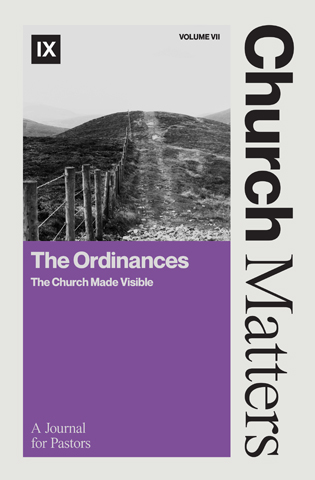Tickets and Teaching: How Spurgeon Fenced the Table
October 21, 2025

October 21, 2025
In 1856, the New Park Street Chapel was bursting at the seams. Since calling their pastor, C. H. Spurgeon, in the spring of 1854, the congregation had seen a remarkable revival. The prayer meetings were marked by spiritual life. The once-empty building was now filled with visitors. Many were asking to be baptized and to join the church.
But that summer, a new problem arose. The church meeting minutes of August 13, 1856 record the following discussion:
It having been reported to our Pastor and the Deacons that certain unworthy persons having partaken of the Lord’s Supper without their knowledge and consent, and that others whom they believe to be Christians but still are walking disorderly by not joining a Christian Church have also been partakers in this divine ordinance.11 . “Church Meeting August 13, 1856,” Church Meeting Minutes 1854-1861, Metropolitan Tabernacle Archives.
A few discerning members raised a serious concern: some visitors who didn’t belong to any church were participating in the Lord’s Supper. They were partaking in an “unworthy” and “disorderly” manner. Apart from the examination and ongoing discipline of a local church, one’s profession of faith is entirely private and unaccountable. As an ordinance of the church, the church has a responsibility to fence the Table, examine those who come, and teach its significance.
A few months later, Spurgeon decided to preach on 1 Corinthians 11:28. Here’s how he explained this responsibility to his church:
We do not hold it right to admit all persons indiscriminately to the Lord’s Supper; we believe the Lord’s Table is the place of communion, and we would have none there with whom we cannot have true Christian fellowship. . . . When, through unholiness of life, lack of piety, or unsoundness in the fundamental truths of the gospel on the part of those who apply to us to be received as communicants, we feel that we cannot commune with them, we hold it to be our bounden duty, as God hath given us authority in his Church, to prevent those from drawing nigh unto the table who would but commune unworthily, and so eat and drink unto themselves judgment.22 . C. H. Spurgeon, Metropolitan Tabernacle Pulpit, Vol. 45, (London: Passmore & Alabaster), 529.
So how did Spurgeon fence the Lord’s Table? Two ways: ticketing and teaching.
From the beginning of his London ministry, Spurgeon continued the practice of open communion. By allowing paedobaptist visitors to the Table, he opened the door for hundreds of visitors to participate. Given the influence of the Church of England, most of the visitors would have been able to claim some kind of baptism from their infancy, even if their profession remained merely nominal.
But Spurgeon refused to be careless in the admission of visitors to the Table. At the church meeting of August 13, 1856, the congregation approved the following motion:
To prevent therefore such unworthy persons from approaching the Lord’s Table; and also to discountenance any disorderly conduct in Christians the following resolutions were unanimously agreed to:
1st, That tickets be given to all individuals who enjoy trans-communion with us
2nd, These tickets to be collected before the Lord’s Supper with those of the Members
3rd, That no person receive more than three consecutive monthly tickets but to be questioned as to the rightness of their position and dealt with accordingly.33 . “Church Meeting August 13, 1856,” Church Meeting Minutes 1854-1861, Metropolitan Tabernacle Archives.
Here, we see three ways that Spurgeon sought to fence the Table for visitors:
First, all visitors needed to be examined by a church officer in order to receive a ticket for the Supper. This meant arranging a meeting with a deacon or an elder earlier in the week for an interview. There the visitor would be examined for any “unholiness of life, lack of piety, or unsoundness in the fundamental truths of the gospel.” In other words, the visitor would need to demonstrate an understanding of the gospel and give some evidence of repentance and faith, the same as any member of the church.
Second, only those who were members of other evangelical churches, paedobaptist or otherwise, would be admitted. It wasn’t enough merely to have a profession of faith. These visitors also needed to be accountable through membership to a local church to come to the Table. So Spurgeon’s open communion was only open as it came to the visitor’s baptism, but not their church membership status. Those who professed to be Christians “but still are walking disorderly by not joining a Christian church” were not to be admitted to the Table.
Finally, Spurgeon did not allow visitors to participate in the Lord’s Table indefinitely. After three months, they were interviewed once again and “dealt with accordingly.” These visitors were eventually encouraged to join New Park Street or return to their home churches and participate in communion there. According to Spurgeon, this interview resulted in many discussions regarding baptism. Sometimes visitors even chose to be baptized and join the church.
As for the members, they each went through a rigorous membership process to join the church.44 . For a description of the membership process at the Metropolitan Tabernacle, see Geoff Chang, “Membership at the Metropolitan Tabernacle: Church Polity with Charles Spurgeon,” https://www.desiringgod.org/articles/membership-at-metropolitan-tabernacle. Once they joined, they were given a communion card with twelve perforated tickets, one for each month. These tickets gave them access to the Lord’s Table. They also helped the elders in their pastoral care by tracking each member’s attendance. The membership process and the ongoing pastoral accountability of the church ensured that the members coming to the Table continued to walk in their profession of faith. Spurgeon wrote:
Among our Baptist churches, fashioned, we trust, somewhat nearer to the scriptural order than certain others we wot [sic] of, we do exercise at least some measure of discipline. We require from those who are members of the church, and who are, by reason of that membership, entitled to commune, that they should, at their reception, give us what we consider satisfactory proofs of their conversion; and we require of them, afterwards, that their conduct should be consistent with the law of Christ; otherwise, we should not in the first place receive them, or having received them, we should not be long before, by the Scriptural process of excommunication, we should remove from our midst those members whose lives and conversation were not in accordance with the gospel of our Lord and Savior Jesus Christ.55 . C. H. Spurgeon, Metropolitan Tabernacle Pulpit, Vol. 45, (London: Passmore & Alabaster), 529.
Despite the rigorous ticketing system, Spurgeon understood its limits. No matter how carefully the elders interviewed each visitor or membership applicant, they could never infallibly see into the heart. Therefore, in addition to using tickets, Spurgeon would solemnly teach on the importance of self-examination before each Lord’s Supper celebration (1 Cor. 11:28).
What might that have sounded like? Here’s an example:
But, my brethren, do what we may—though we fence the table with the utmost diligence, and though we continually warn you not to deceive us, and not to deceive yourselves, seeing that you cannot deceive God—yet are we perfectly aware that the greater part of the guarding of the table must rest with yourselves. We believe it to be our bounden duty, as God shall give us grace, to take care, so far as we can, that unworthy persons are not received at the Lord’s Table. Yet man being mortal, is fallible and erring; so we cannot judge you, and we must leave the greater part of your examination, before you come to the sacred Table of the Master, with yourselves.
Remember, dear friends, that no recognition by the minister, no reception by the deacons or elders of a church, will excuse you for coming to the Lord’s Table if, when you come, you are not a really converted person. It is true that you cannot come there unless the church itself consents to your coming; but the church takes upon itself none of the responsibility of your fitness; it says to you, “You may come to the Table of Communion; but if you have deceived us, on your own head be the sin; and if you are not what you profess to be—true believers in Christ—your unlawful observance of the ordinance must be accounted for, at the last great day, amongst the rest of your transgressions.”
And I do now, most solemnly and earnestly, as the Pastor of this church, in the name and on behalf of this church, warn all men and women now about to draw nigh unto this Table that, if they be not God’s children, and have no faith in Christ, they do stop before they, with sacrilegious hands, touch the elements of this sacred Supper. We would have them know that it can be of no service to them, but will increase their sin, and add to their guilt, if they do, after such a warning as this, come to the Master’s Table without having examined themselves, and without being thoroughly persuaded in their hearts that they have been born of God.66 . C. H. Spurgeon, Metropolitan Tabernacle Pulpit, Vol. 45, (London: Passmore & Alabaster), 529-530.
To be sure, this is not a self-examination of theological knowledge, perfect holiness, or position in the church. Rather, this is about being “born of God,” having “faith in Christ,” and being “true believers in Christ.” In other words, this is about being a true Christian because the Lord’s Supper is only for true Christians. This is a teaching that every communicant needs to understand so that they may approach the Table with faith and joy.
If you are a pastor or church leader, you will likely not find the use of communion tickets useful for your context (though perhaps in some larger churches, it might not be a bad idea!). In the churches I’ve pastored, we have found it sufficient to fence the Table verbally. We do so by inviting to the Table those who are members of our church in good standing, as well as any visitors who have made a profession of faith through baptism and are continuing in that profession through membership in a gospel-preaching church. For all others, we ask them to let the elements pass by and to use the time for reflection and prayer. Additionally, we create space in our Lord’s Supper liturgy for prayer, confession, and self-examination.
The goal in all this is not for the Lord’s Supper to become a somber and sad occasion. Rather, it’s the opposite. Spurgeon understood that the Lord’s Supper was a celebration. It was about communion with Christ and his people. The joy of that communion is only possible when we are reminded of his spiritual presence with us in the elements and the gathering of the church. May Spurgeon’s words from his famous communion hymn be the experience of our churches:
Amidst us our Beloved stands,
And bids us view His pierced hands;
Points to His wounded feet and sides,
Blest emblems of the Crucified.
What food luxurious loads the board,
When at His table sits the Lord!
The wine how rich, the bread how sweet,
When Jesus deigns the guests to meet!77 . C. H. Spurgeon, Our Own Hymn Book: A Collection of Psalms and Hymns for Public, Social, and Private Worship (London: Passmore and Alabaster, 1869), 573.

Within the sacred gathering of the local church, Jesus offers the chance to see with your eyes and taste with your mouths what he has done for you all.
Go to Journal →